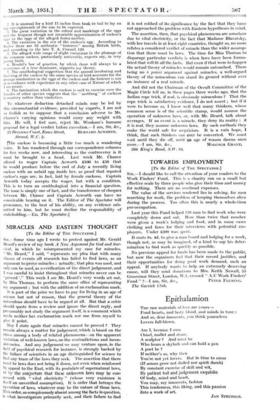MIRACLES AND EASTERN THOUGHT
[To the Editor of Tan SPECTATOR.]
Sni,—Some time ago I wrote to protest against Mr. Gerald Heard's review of my book A New Argument for God and Sur- vival, in which he Misrepresented my case for miracles. " Mr. Heard," I said, " represents my plea that ivith many classes of events all research his failed to find laws, as an argument to-prCive miracles : actually, that plea was used, and only can be used, as a verification of the direct judgement, and I was careful to insist. throughout that miracles never can be ' proved '." This week I see Mr. Heard's N'ery words* set out, by Miss Thomas, to perform the same office of representing my argument ; but with the addition of an exclamation mark.
It is Part of the price we have to pay for living in an age of science but not of reason, that the general theory of the miraculoua should have to be argued at all. But that a critic should quote from a review and ignore the direct reply, and presumably not study the argument itself, is a comment which needs neither her exclamation mark nor one from myself to give it point.
May I state again that miracles cannot be proVed ? They remain always a matter for judgenient, which is based on the chaos among a body of related phenomena—on the apparent violation of well-known laws, on the contradictions and incon- sistencies. And any judgement we may venture upon, in the field of psychical research for instance, is strongly backed by the failure of scientists in an age distinguished for science to find any trace of the laws they seek. The assertion that there must be laws does not bring it down, not even when reinforced by appeal to the East, with its postulate of supernatural laws, or by the conjecture that these unknown laws may be con- cerned with " vital electricity " (whose very existence is itself an unverified assumption). It is order that betrays the operation of laws, whatever may be the nature of those taut. This order, so conspicuously absent among the facts in question, is what investigators primarily seek, and their failure- to find
it is not robbed of its,signifleance by the fact that they have not approached the problem with Eastern hypotheses in mind.
The assertion, then, that psychical phenomena are somehow due to vital electricity, or the fact that Madame Blavatsky, with her travels in at least eight countries, thought so, no more refutes a considered verdict of miracle than the wider assump- tion that there must be laws. The time for Miss Thomas to disparage particular verdicts is when laws have been forma-. lated that will fit all the facts. But even if that were to happen the actual theory of miracles would remain untouched. There being no t's priori argument against .miracles, a well-argued theory of the miraculous can stand its ground without ever an instance of a real miracle.
And did not the Chairman of the Occult Committee of the Magic Circle tell us, in these pages three weeks ago, that the Indian rope trick, if real, is obviously miraculous ? That the rope trick is satisfactory evidence, I do not assert ; but if it were to become so, I know well that many thinkers, whose common sense is of the scientific stamp, would assume the operation of unknown laws, or, with Mr. Heard, talk about averages. If an event is a miracle, they deny its reality : it it is real, they assume unknown laws. By such methods they make the world safe for scepticism. It is a vain hope, I think, that such thinkers can ever be converted. We must wait until they die off, until an age of reason dawns once








































 Previous page
Previous page